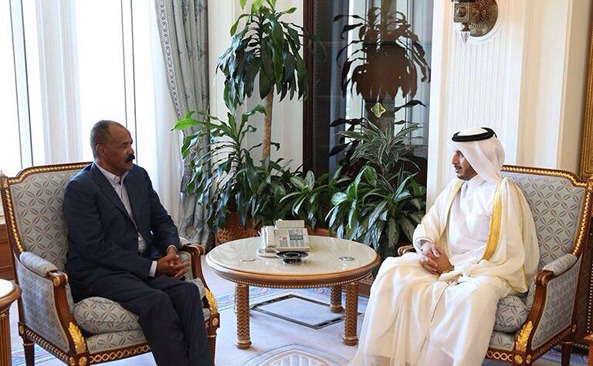Asmara (HAN) March 20th 2014 -Fikrejesus Amahazion- In recent years, a number of commentators have regularly referred to Eritrea, a young, developing country located in the volatile Horn of Africa, as isolationist, the “North Korea” of Africa, or the “hermit kingdom.” While such statements suggest Eritrea remains detached from the global community, closer analysis reveals that they are clich�d, overly simplistic, and largely incorrect.
Sources: Eritrean president Isaias Afwerki has asked Qatar to mediate his long-standing feud with Ethiopia. This message was communicated to the new Ethiopian Prime Minister, Hailemariam Desalgn, by the new Qatari Amir , while the Eritrean leader was conducting a state visit last week in Doha, Qatar.
For example, the months since late December 2013 have witnessed: Eritrea’s President, Isaias Afewerki, travel to Qatar to promote cooperation and bilateral ties; Eritrea host a UN delegation which noted Eritrea’s impressive progress towards achieving the UN Millennium Development Goals[ii]; Eritrea appoint 14 new Ambassadors to different countries and
regional organizations[iii]; the visit of Finland’s Minister for International Development, Pekka Haavisto, to promote international interaction and enhance the European Union’s (EU) dialogue with Eritrea[iv]; and Eritrea’s signing of several bilateral agreements with both Turkey and Russia.[v] Additionally, recent weeks saw Eritrea address
the 25th Session of the UN Human Rights Council, and participate in the 58th Session of the UN Commission on the Status of Women (CSW). While far from a comprehensive list of Eritrea’s broad range of diplomatic activities, the examples offer a brief illustration of the country’s commitment to respectful, egalitarian, mutually beneficial partnerships
with members of the international community.
A potentially more incisive tool to critically examine references to Eritrea being “isolationist” or the “hermit kingdom” is by considering the country’s memberships in international non-governmental organizations (INGOs), referred to as INGO ties. Popular within international, cross-comparative analyses in sociology and political science, INGO ties
are typically utilized by researchers to capture a state’s level of embeddedness within world society. Simply, states with more INGO ties are more embedded in world society and states with less INGO ties are less embedded.
Utilizing data from the Yearbook of International Organizations, annually published by the Union of International associations – described as providing the “most extensive information on organizations in the
world”[vii] – Eritrea’s INGO ties per 100,000 citizens was 2.06 for the year 2005 and 2.04 for the year 2010. By comparison, for the years 2005 and 2010 respectively, per 100,000 citizens: Ethiopia had 0.52 and 0.47 ties;
Sudan had 1.42 and 1.37 ties; Uganda had 1.98 and 1.78 ties; Tanzania had 1.54 and 1.34 ties; and Kenya had 2.47 and 2.2 ties. Effectively, rather than isolation, the above data on INGO ties suggest that Eritrea is amongst the most internationally embedded countries within its region.
Finally, another useful method to examine claims of Eritrea’s isolation is by considering its diplomatic representation abroad. Within sociology, international relations, and political science, diplomatic representation abroad has been seen as important for fostering and maintaining friendly relations between states, and between states and other actors. Amongst
other things, it helps promote states’ socio-economic and political interests, while also encouraging understanding, coordination, and the solving of problems.
According to Eritrea’s Permanent Mission to the African Union (AU), Eritrea currently has 36 diplomatic missions abroad. By comparison, Kenya has 50, Uganda 31, Ethiopia 39, Tanzania 32, Sudan 64, and Djibouti 50. However, considering the number of diplomatic missions in relation to the number of years since formal independence – an important factor in establishing diplomatic representation abroad – illustrates that Eritrea’s ratio is 1.7. By comparison, Kenya’s ratio of diplomatic missions abroad in relation to years since independence is 0.98, while Uganda’s is 0.6, Djibouti’s is
1.35, Sudan’s is 1.1, Tanzania’s is 0.6, and Ethiopia’s is 0.53. Simply, Eritrea establishes diplomatic missions abroad at a faster rate than its regional neighbors.
Overall, the preceding discussion suggests claims that Eritrea is isolationist, the “North Korea” of Africa, or the “hermit kingdom” are overly simplistic and incorrect – particularly when Eritrea’s neighbors are also examined. Moving forward, as Eritrea works toward improving the lives of its people, it should also continue to foster regional and global
relations. Doing so will not only encourage regional peace and stability, but also support economic and general development.
HAN & Geeska Afrika Online ( Opinion Contributed by: Yemane Abselom yemane.abselom@gmail.com
–
HAN & Geeska Afrika Online (1985-2014), The oldest free independent Free Press in the region, brings together top journalists from across the Horn of Africa. Including Ethiopia, Somalia, Eritrea, Sudan, Djibouti, South Sudan, Uganda, Kenya, Oromo, Amhara, Somali, Afar and Harari. Plus, we have daily translations from 150 major news organizations in the Middle East and East African regions. Contact at news@geeskaafrika.com

Leave a Reply